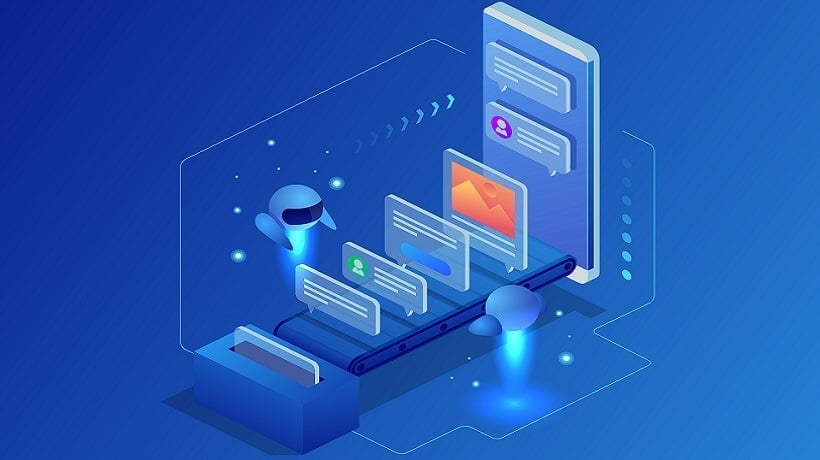Artificial intelligence (AI) and machine learning (ML) have revolutionized the way businesses operate, offering new and innovative solutions for various industries. The mobile app industry is no exception, with AI and ML being integrated into various aspects of mobile app development, from chatbots to predictive analytics.
In this article, we’ll discuss how AI and ML can be used in mobile apps and the benefits of using these technologies.

Chatbots
One of the most popular uses of AI in mobile apps is the integration of chatbots. Chatbots are computer programs that use natural language processing (NLP) to communicate with users in a conversational manner. They can handle simple queries, provide information, and even perform specific tasks, such as booking a flight or ordering food.
Chatbots can provide a personalized and convenient experience for users, reducing the need for manual interaction with customer support. They can also operate 24/7, providing prompt and efficient support to users.
Image and Speech Recognition
Another popular application of AI in mobile apps is the image and speech recognition. Image recognition technology allows apps to recognize and identify objects in images, while speech recognition technology allows apps to transcribe and interpret speech.
These technologies can be used in a variety of mobile apps, from virtual assistants to camera apps. For example, a camera app that integrates image recognition technology can automatically identify and tag objects in a photo, making it easier for users to sort and organize their photos.
Predictive Analytics
Predictive analytics is another area where AI and ML can be applied in mobile apps. Predictive analytics involves using data, statistical algorithms, and machine learning techniques to identify patterns and make predictions about future events.
In mobile apps, predictive analytics can be used to provide personalized recommendations to users, such as recommending new products or services based on their purchasing history. It can also be used to anticipate user needs, such as pre-loading content based on the user’s past behaviour.

Natural Language Processing
Natural language processing (NLP) is a branch of AI that deals with the interaction between computers and humans using natural language. NLP can be integrated into mobile apps to provide users with a more human-like experience, such as enabling them to interact with virtual assistants using natural language.
For example, a virtual assistant app that integrates NLP technology can understand and respond to questions asked in natural language, making it easier for users to get the information they need.
Personalization
Personalization is another area where AI and ML can be applied in mobile apps. Personalization involves tailoring the user experience to the individual user, providing them with relevant and personalized content and recommendations.
For example, a news app that integrates AI and ML can personalize the content it displays to the user, showing them articles and topics that are relevant to their interests. This can result in a more enjoyable and engaging experience for the user.
Fraud Detection
AI and ML can also be used for fraud detection in mobile apps. Fraud detection algorithms can analyze large amounts of data and identify patterns and anomalies that may indicate fraud.
For example, a financial app that integrates fraud detection algorithms can automatically detect and flag suspicious transactions, reducing the risk of fraud and ensuring the security of user funds.
Improved User Experience
In addition to the specific applications discussed above, AI and ML can also be used to improve the overall user experience in mobile apps. For example, AI algorithms can be used to optimize app loading times, reduce battery usage, and improve app performance.
Machine learning algorithms can also be used to provide real-time feedback to developers, allowing them to identify and fix bugs and performance issues quickly.

Benefits of using AI and Machine Learning in Mobile Apps
Improved User Experience
One of the biggest benefits of using AI and ML in mobile apps is the improved user experience. AI and ML technologies allow apps to provide personalized and relevant content and recommendations, making the user experience more enjoyable and engaging.
Increased Efficiency
The use of AI and ML in mobile apps can also increase efficiency. Chatbots, for example, can handle simple queries and perform specific tasks, reducing the need for manual interaction with customer support. This can save time and resources for both the user and the company.
Data-Driven Decisions
The use of AI and ML technologies can provide a wealth of data that can be used to make informed decisions. Predictive analytics, for example, can provide insights into user behaviour and preferences, allowing companies to make data-driven decisions about product development and marketing strategies.
Enhanced Security
AI and ML technologies can also enhance security in mobile apps. Fraud detection algorithms, for example, can detect and flag suspicious transactions, reducing the risk of fraud and ensuring the security of user data and funds.
Cost Savings
Finally, the use of AI and ML in mobile apps can result in cost savings. Automating tasks with chatbots and predictive analytics can reduce the need for manual labour, saving time and resources.
Conclusion
In conclusion, AI and ML have a lot to offer the mobile app industry. From chatbots and image and speech recognition to predictive analytics and personalization, AI and ML technologies are providing innovative solutions for various aspects of mobile app development.
The use of AI and ML in mobile apps has the potential to provide a better user experience, increase efficiency, provide valuable data, enhance security, and result in cost savings. Companies that are looking to stay ahead of the curve should consider integrating AI and ML into their mobile app development strategies.



















